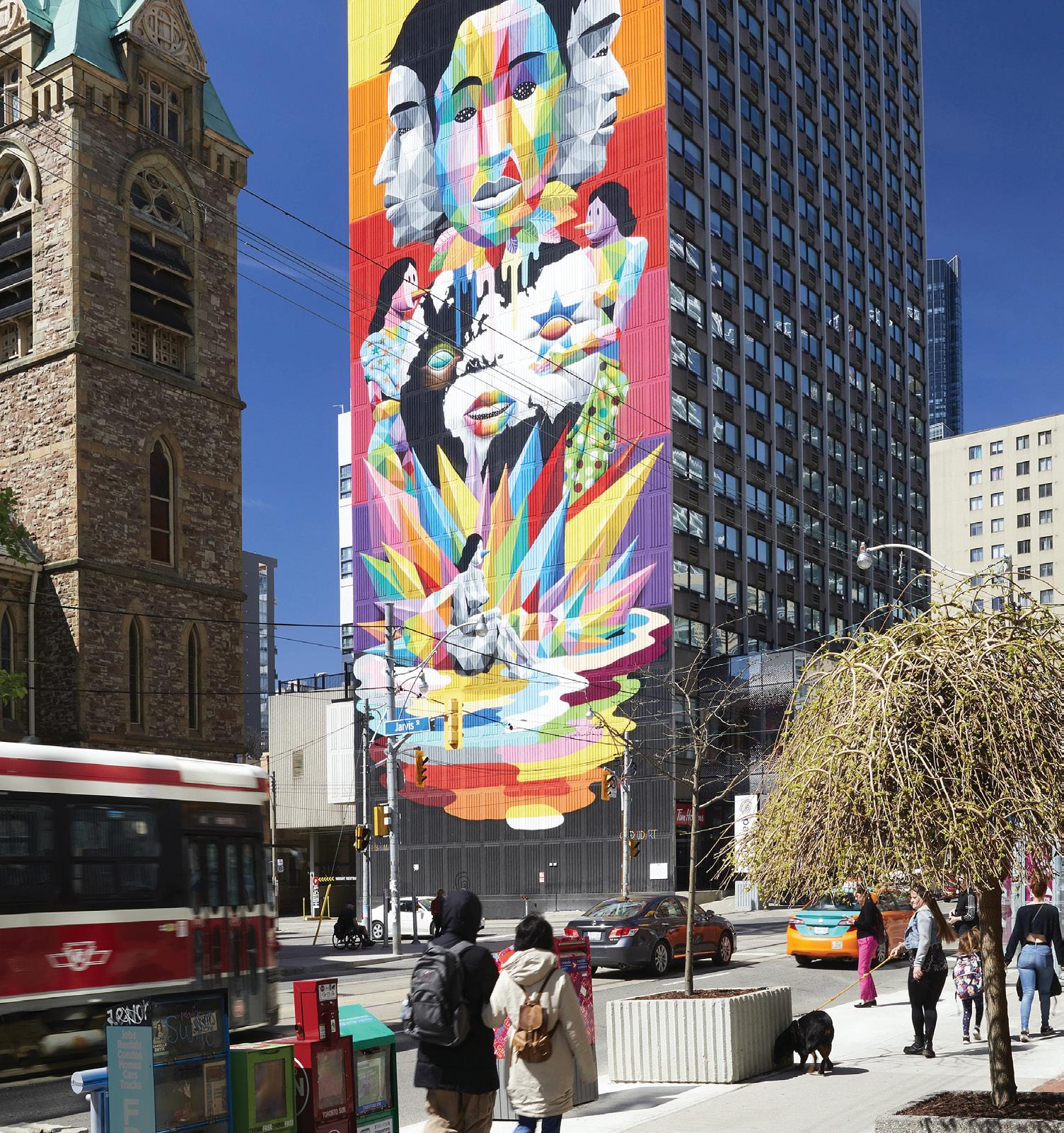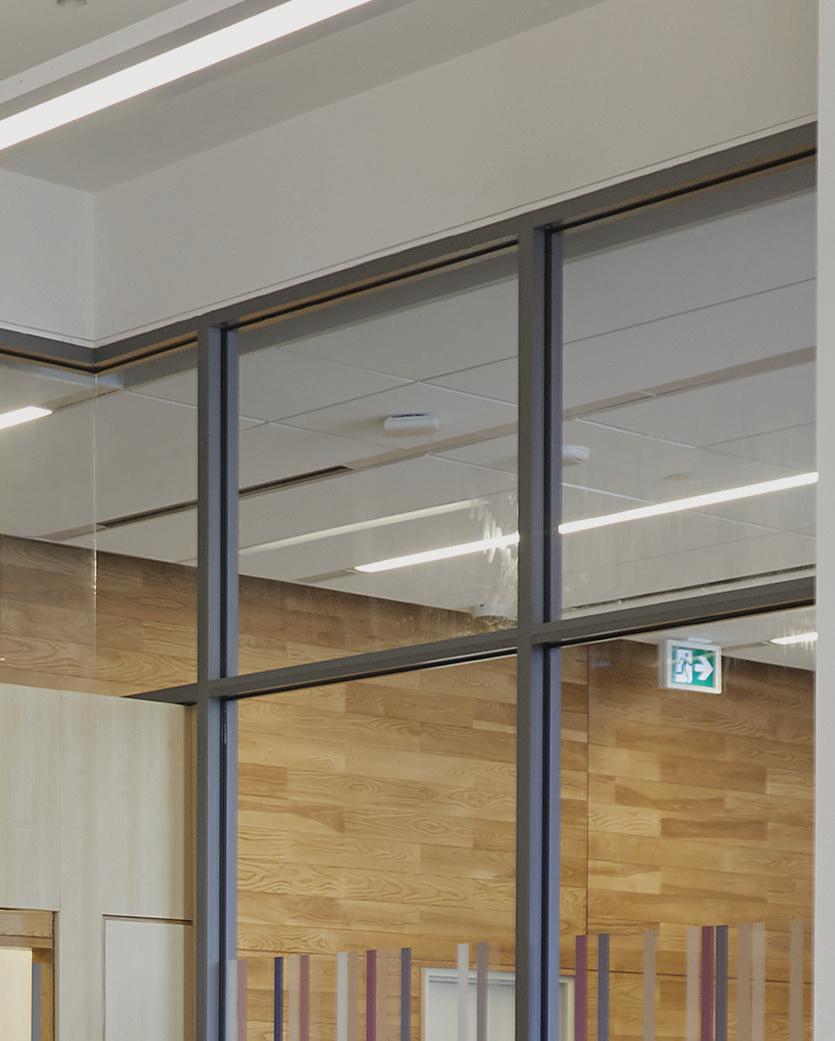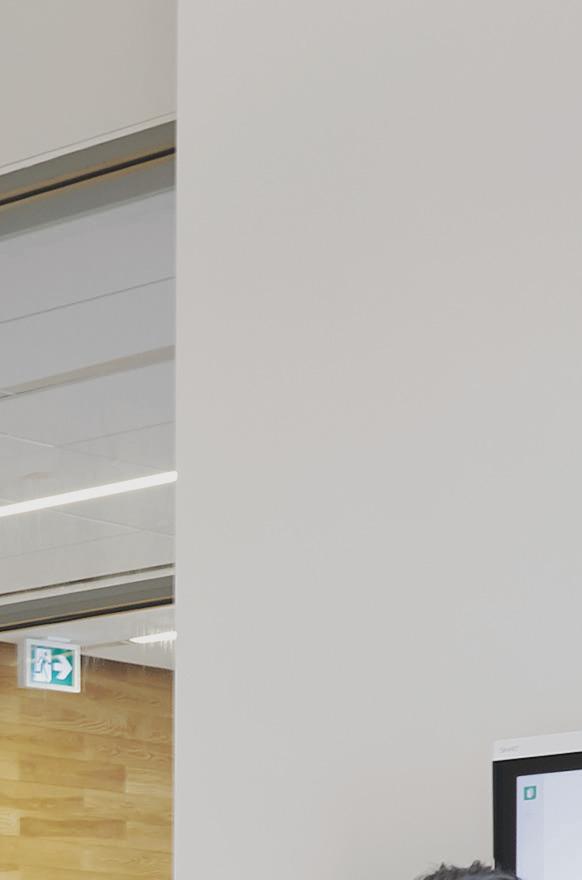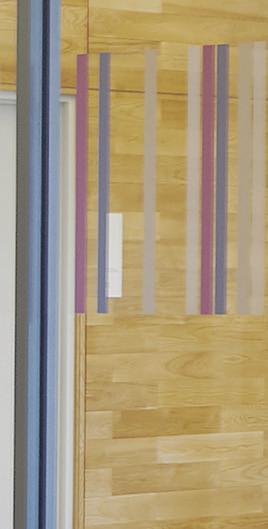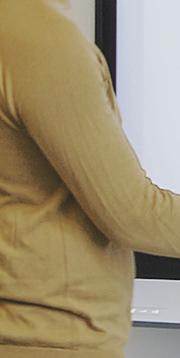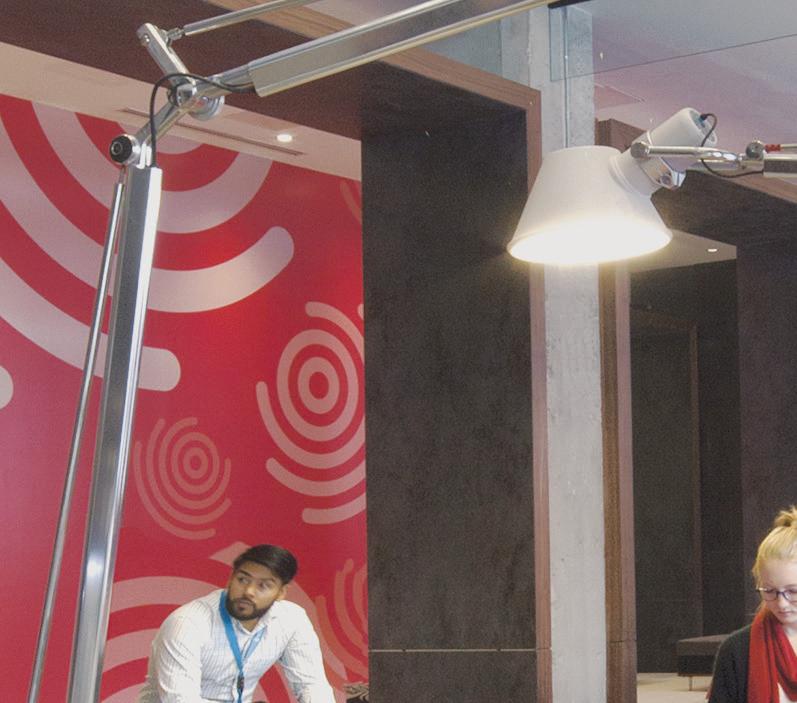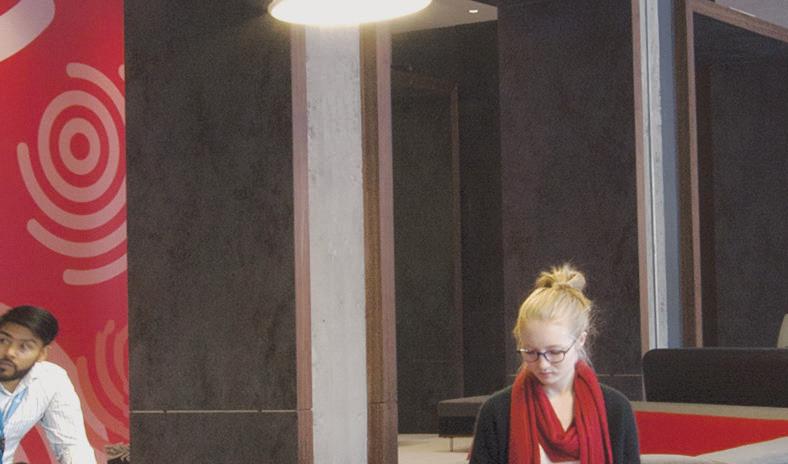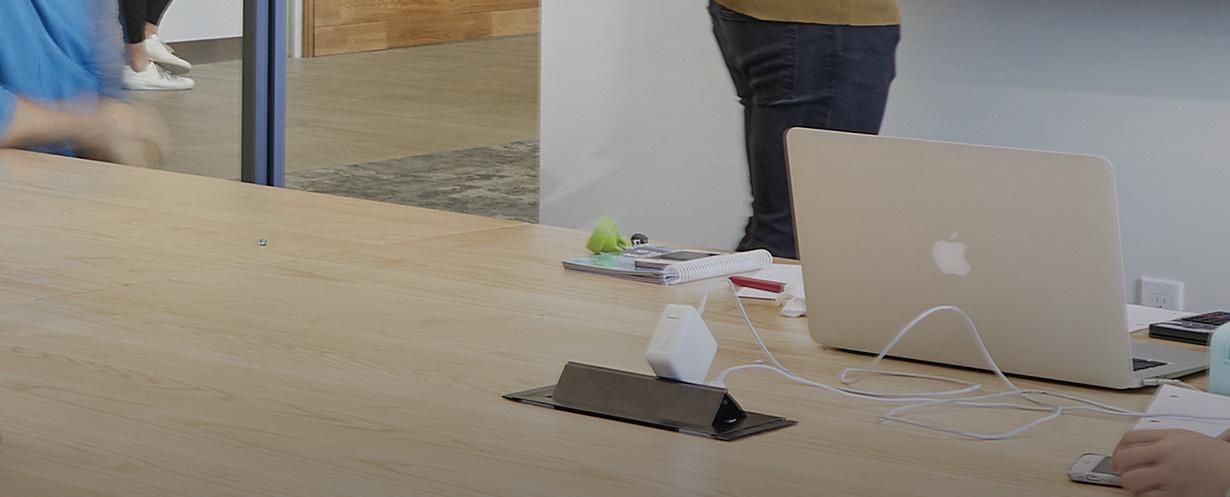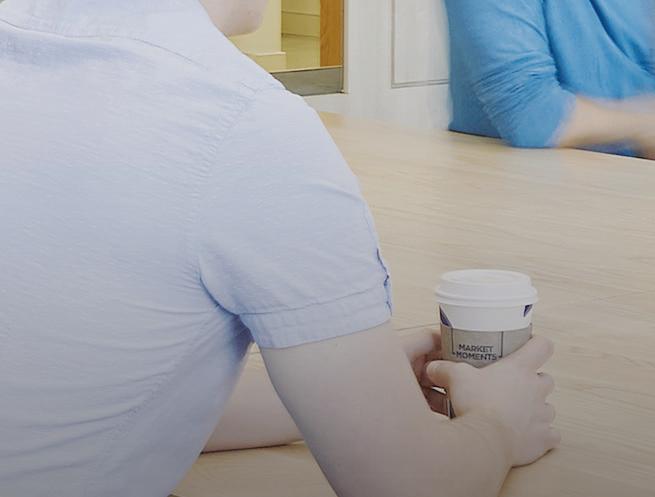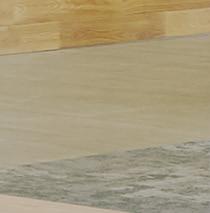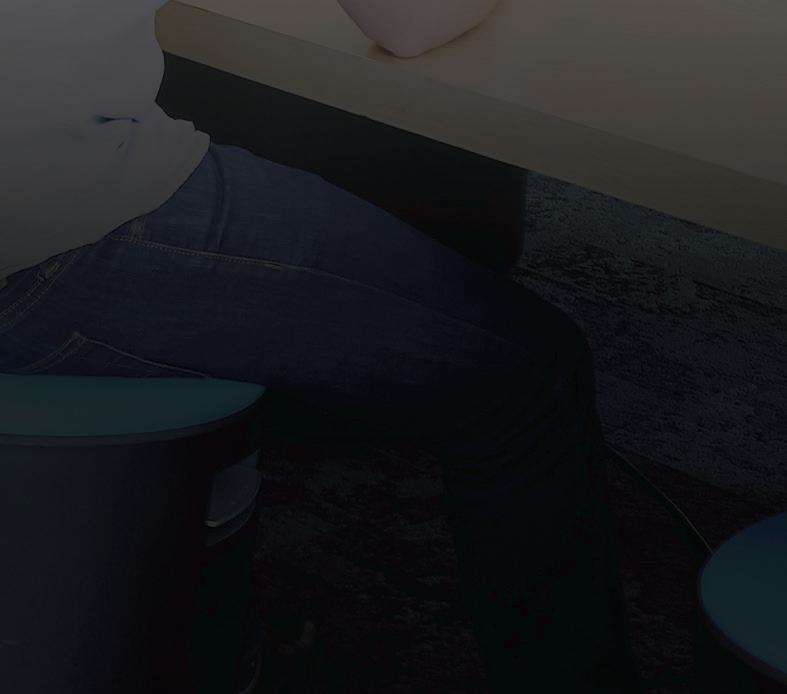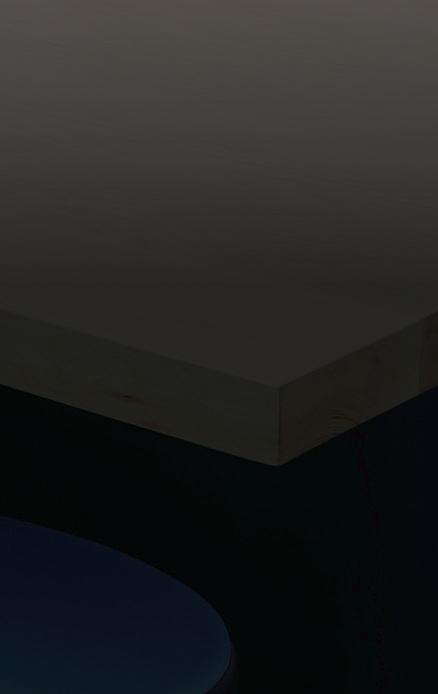






In February of 2022, Nicole Agyenim Boateng was walking back to her residence at the International Living and Learning Centre (ILC) when she thought she was being followed by a man.
“All I could think about is there’s nowhere else for me to run,” says the third-year child and youth care student. For my own personal safety, I have to go to somebody else.”
She spotted a police car nearby and was faced with a decision: going to the police officer or potentially being harmed by the person who was clearly following her.
“As a Black woman, I did not know what this man was going to do. I’m a Black person approaching a cop car. I don’t know what [the officer’s] going to do,” says Boateng.
“That was what I was thinking in my head: Which one is worse?”
torically marginalized by the police.”
A TPS report released in June 2022 found that TPS officers used force on Black people “four times more often than their share of the population” in 2020, according to an analysis by the Toronto Star
Just last week, CTV News reported that University of Toronto student Hasani O’Gilvie was on his way to write a final paper on campus in August 2021, when he was allegedly followed and Tased several times by multiple TPS officers.
“incidents involving assault, assault with a weapon, vandalism and theft, as well as the enforcement of smoking by-laws,” according to the Community Safety and Security department.
The program was approved in May 2020. However, two weeks later, it was cancelled following backlash from various student groups and amidst global protests against antiBlack racism and police brutality.
until March 2019. The full report was finally released in July 2020.
According to its findings, Black students felt that security was an intimidating force for them. Students reported being followed on campus, asked for identification and “experiencing the condition of always assumed as not belonging,” the report said.
“This petition shows that those who police normally protect— those who have private property, white women and white people, cisgender people, able-bodied people—those people are going to be kept most safe,” says Tecle.
He says the school’s increased security measures enforces an “us” versus “them” mentality.
Following Toronto Metropolitan University’s (TMU) recent increase of security and policing on campus, some Black and Indigenous community members say they are concerned.

In January, TMU announced that it made several “security enhancements” to Kerr Hall and around campus prior to the fall 2022 semester.
In addition to adding more security guards, the school also said it began a partnership with the Toronto Police Service (TPS) to have officers on campus.
TPS, which recently increased its 2023 budget by $48.3 million— now sitting at $1.1 billion as reported by CTV News—will “provide an additional layer of support for [TMU’s] security team,” according to the announcement.
TPS did not respond to The Eyeopener in time for comment.
The new measures were put in place following a sexual assault which occurred in March 2022 in Kerr Hall. Another sexual assault also occurred in the building in October.
While the increased security measures may prove beneficial for some, other TMU students and faculty have raised concerns that not everyone’s safety is being taken into consideration.
Boateng says additional police presence on campus makes her uncomfortable.
“Being able to arrest people on campus won’t make campus safer,” she says. “Especially for Black and Indigenous youth who have been his-
Police labelled the incident as a case of “mistaken identity,” according to CTV News. The O’Gilvie family says this was not a case of mistaken identity but a case of “walking while Black.” O’Gilvie and his family are now suing TPS for $2.4 million in damages.
TMU president Mohamed Lachemi told The Eye in an emailed statement that the school recognizes “that each individual’s lived experience informs their perspectives of security on campus, and while some people feel safer in the company of uniformed security, others feel unsafe.”
Lachemi said the school is looking to implement a “community safety model” that addresses these concerns by working with the Presidential Implementation Committee to Confront Anti-Black Racism to develop strategies to implement the report’s recommendations.
This means conducting equity, diversity and inclusion training programs for the Community Safety and Security department, including security guards, he said.
As previously reported by The Eye, the TMU’s Canadian Students for Sensible Drug Policy (CSSDP), now known as Students for Harm Reduction, also launched a ‘No Cops on Campus’ campaign against the special constables program in May 2020, which included a petition that called for transparency about the complaints made against TMU security and “a transition strategy for alternatives to uniformed security on campus.”
CSSDP, along with other student groups, including the Black Liberation Collective (BLC) and Indigenous Students Rising (ISR) had also been organizing against police presence on TMU’s campus for years prior.
In Nov. 2016, the BLC and ISR called on the university to look into the anti-Indigenous racism and anti-Blackness within the institution, specifically at the School of Social Work. The open letter published by the BLC describes an incident in which a professor participated in a form of anti-Black racism in the classroom.
The following March, the BLC shared on its Facebook that it had met with TMU and the university had committed to conducting a full report titled the Anti-Black Racism Campus Climate Review (ABRCCR).
BLC co-founder and TMU alumnus Josh Lamers told The Eye in 2020 that they were unimpressed with the months-long delay and lackluster conclusions by the university. “This is not the report that [the] BLC demanded, this is not the report that we fought for, this is not the report that honours… our work,” they said.
“Policing always, always produces the criminal; it produces the ‘other,’ produces the dangerous, it produces the Black person, the homeless person, [the] queer person. That’s what policing does,” he says.
TMU assistant professor Megan Scribe says the university’s decision to increase security presence on campus ignores these different relationships the community might have with policing powers.
While conversations around removing cops from TMU’s campus have been happening for years, the recent incidents of sexual violence in Kerr Hall have created a renewed demand for safety.
According to an investigation published in the Toronto Star earlier this month, some students and faculty members expressed feeling unsafe on campus given the recent incidents in the building.
In Nov. 2022, Hannah Powell, a second-year student at TMU, started an online petition calling for increased security personnel presence. The petition has since garnered more than 13,000 signatures.
Sam Tecle is an assistant professor at TMU and expert on Black diaspora and cultural production.
Scribe, whose work focuses on how racist and anti-Indigenous gender-based violence uphold white settler societies, clarifies that policing powers don’t just entail security, but also paramedics and other frontline responders, who can take a carceral approach in their roles.
She says TMU’s updated security measures can further perpetuate on-campus violence through exacerbating fear.
“It reinforces this antagonism [between] the university and the broader downtown community that includes unhoused folks, includes people who are abandoned by the city in various ways on the basis of race or gender or substance use,” says Scribe.
TMU has tried to partner with TPS in the past. In August 2019, the university tried to introduce a special constables program on campus, where TMU employees would have policing authority in
It looked to “better understand the realities Black students, faculty and staff face in order to create an environment where they can thrive,” the university said in a statement on TorontoMet Today.
While TMU promised to conduct the Review back in 2017, the university didn’t begin the ABRCCR
He says instances of sexual violence require solutions that don’t involve putting the community further in harm’s way. “I’m not discounting this violence but we’re also going to be scared—Black people, racialized people—when you bring more security and police on campus,” he says.
Tecle notes that police and security are reactionary and that the university should be focused on relationship-building within the community, having teach-ins and speaking about safety when there’s no pending crisis.
“It’s not about putting more police on campus,” says Boateng. “It’s more us, as a community, keeping each other safe … it’s about all of us together keeping ourselves safe.”
files from Racy Rafique, Manuela Vega and Sarah Krichel
With
“I’m a Black person approaching a cop car. I don’t know what [the officer’s] going to do”
“Being able to arrest people on campus won’t make campus safer”
“Policing always, always produces the criminal; it produces the other”KONNOR KILLORAN/THE EYEOPENER
The Good Food Centre (GFC) said it has seen a dramatic increase in the number of students using its services since it re-opened on campus last semester.
The food bank is an organization under the Toronto Metropolitan Students’ Union (TMSU) which advocates for the food security rights of post-secondary students and supports Toronto Metropolitan University (TMU) students facing food insecurity, according to its website.
The drop-in services reopened in Sept. 2022, after their pandemic closure, said staff member Tasneem Rashid.
GFC operational lead Lauren Barch said the campus location saw a limited number of students who went by to pick up groceries between September and December of 2022.
But since the centre reopened after the winter break on Jan. 18, 2023, Barch said there have been long lineups.
The TMSU said in a statement to The Eyeopener that they have seen a 512 per cent increase in GFC users since the start of this academic year.
The centre is open from Wednesday to Friday. It opens from 1:30 p.m. to 6:30 p.m. on Wednesdays, after the centre receives its grocery stock for the week earlier in the day.
On Thursdays, the centre opens at noon and closes at 6 p.m. Depending on stock, the GFC is open from noon until 3 p.m. on Fridays.
Rashid said the GFC has been getting additional students signing up every week.
“There’s been a lot more members coming in and using the service compared to when we first opened,” she said.
Liana Yadav, a first-year business management student who recently
started using the weekly service, said it made a difference to her grocery bills as an international student.
“It is [good] to know that somebody on campus is thinking about students like me,” she said in an interview.
TMU community members who register for the food bank membership are asked to fill out a short questionnaire about the size of their household and if there are any dependents they are supporting. This helps the food bank determine how many points to give students.
Accordingly, participants are given at least ten points each week that they can exchange for groceries like milk, vegetables, meat and other necessities.
Abdul Wahab, a second-year economics and finance student, has been using the service since September.
“As now more and more people come to know of it every week, by the time I usually get there, more of the stuff is already gone,” he said.
With the increase in demand, the centre is working towards bringing in more sponsorships and donations.
As of now, the GFC mainly relies on monetary donations to purchase food from the Daily Bread Food Bank, an organization that supports food banks across the Greater Toronto Area.

“I’m not sure how much or who contributes exactly what amount, but usually when we do get donations, it’s funds, not food specifi -
visits to food banks across Canada in March of 2022 alone.
This rate of food bank usage shows a 15 per cent increase since March 2021 and a 35 per cent increase from pre-pandemic times.
According to Statistics Canada, yearly food prices rose by 11.4 per cent for groceries purchased in stores.
Barch finds it rewarding to see more people benefiting from the food bank.
“Sometimes, asking for help is really hard for certain people,” said Barch.
“I think the rise in numbers just shows that people are more comfortable with using the service.”
The GFC asks about the students’ dietary restrictions and allergies, which Wahab said was a relief for him, since he only consumes halal meat.
“We’re also trying to introduce more culturally inclusive foods,” said Barch. “We’re going to be starting to implement that this semester.”
their outreach efforts since the reopening of campus.
In addition to the food bank, the GFC also posts recipes on their social
Tim Li, a research program coordinator at PROOF, a research program at the University of Toronto that studies food insecurity in Canada, said more attention needs to be placed on the causes of food insecurity among post-secondary students in Canada.
media and runs equity-related events.
“We would have breakfast days, where we would have coffee and hot chocolate, just as something to start. We definitely plan on having more events with other equity services,” said Rashid. She also said any food that looks like it is nearly expired is handed out to random students on campus.
“We need to have more research and a frank conversation around all these aspects that play into students’ financial circumstances and their ability to feed themselves,” Li said.
He noted that food insecurity in a community is a symptom of a deeper problem rooted in the inadequacy of incomes and a lack of income support programs from the government.
Li said food banks are only a temporary solution as Canada works towards bringing systemic change.
cally,” said Barch.
It’s not just the GFC that is seeing a rise in demand.
According to Food Banks Canada, there were a total of over 1.4 million
Barch said currently, the food bank is working on a “hunger report” to assess the extent of food insecurity in the TMU student population to re-evaluate and improve
The GFC also has a community garden in which they grow lettuce, beets, cucumbers and broccoli, according to their website. The garden’s produce is used to provide the food bank with local and fresh produce.
The TMSU told The Eyeopener that the community garden has been cleaned up and will be reopening in the spring of 2023.
“The problem is too big and too severe and it’s rooted in something deeper that is really about the inadequacy of our income. So really the inadequacy of wages, the inadequacy of income supports in Canada,” he said.
“The goal we should be looking towards is a system in which food banks aren’t needed,” Li added.
Some TMU students may be impacted by the Toronto Transit Commission’s (TTC) upcoming plans to raise fares for adults and youth. These new measures are a part of the TTC’s 2023 operating budget, which was announced on Jan. 9, 2023.

The TTC plans to increase its fare by 10 cents for youth and adults starting in April, while keeping monthly passes at their current price.
The budget also includes a return to “pre-covid standards,” increasing crowding limits and some service with longer wait times.
Some TMU students are wary about the TTC’s new plans, especially
given the increased use of public transit with the full return to campus.
Giobannie Santos, a third-year nursing student, expressed concern about how this would affect low-income people’s ability to reach the whole city affordably.
“People rely on the TTC. Depending on their income and the different things that they spend money on… it can be an added burden for some people,” said Santos. “Even as a student, it adds up.”
In the 2021 budget, the TTC proposed freezing fares due to the ongoing COVID-19 pandemic.
Murtaza Haider, a data science and real estate management professor at TMU with expertise in transportation, said the TTC needs income caused by the loss of revenue
in recent years.
“The rapid and drastic decline in transit ridership since the onset of the pandemic meant that fare revenue has shrunk considerably whereas operating costs have not,” said Haider, in a written statement to The Eyeopener
The TTC said in the budget, a multi-year funding strategy will address their “mid-term systemic revenue shortfall.”
While the 10 cent increase would have a small financial impact on many commuters, low-income commuters like seniors and students will find the fare increase troubling, said Haider.
Read more at theeyeopener.com
“There’s been a lot more members coming in and using the service compared to when we first opened”
“The goal we should be looking towards is a system in which food banks aren’t needed”KINZA ZAFAR/THE EYEOPENER
After three years of frozen fares, the thaw reveals a 10 cent increase in price
Abeer “Reddit Mod” Khan
News
Jake “Happy” MacAndrew’ Gabriela “First” Silva Pointe Racy “Week!” Rafique
Photo
Konnor “No Longer a Contrib” Killoran
Vanessa “Sorry For Ghosting” Kauk Kinza “Fairwind Connection” Zafar
Online
Thea “Fudging” Gribilas Madeline “Numbers” Liao
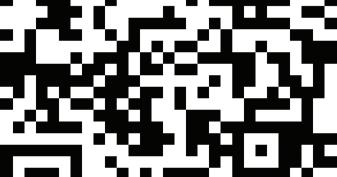
Features
Stephanie “InDesign Vet” Davoli
Arts and Culture
Shaki “JIMIN <3” Sutharsan
Business and Technology
Natalie “Ready To Go!” Vilkoff
Communities
Negin “Mastering” Khodayari
Sports
Jack “Printer Yoda” MacCool
Fun and Satire Zarmminaa “Walrus Girlie!” Rehman
Media
Sonia “Booked and Busy!” Khurana Youdon “Cityline Slay!” Tenzin
Web
Nishil “Design” Kapadia
Sam “Legends” Chowdhury
General Manager
Liane “Small Town Girl” McLarty
Advertising Manager
Chris “Get Well Soon <3” Roberts
Design Director





J.D. “A Welcome Error” Mowat
Contributors
Asha “Research Ready” Swann Rajalaxmi “GCC” Nayak
Maryam “Lightning McQueen” Azzam
Hafsa “Fare & Accurate Reporting” Hanif
Sam “Joey B top-two” Beaudoin
Raphael “Best Beard” Chahinian
Julian “Pigeon Hockey” Bettencourt
Dexter “Recap God” LeRuez
Armen “Booth To Scrum” Zargarian
Jordan “Back In The Slack” Jacklin
Matthew “Content Legend” Lin
Nathan “Sideline Drip” Gerson
Berry “King” Shi
Mikayla “Doodles” Hale
Oceanne “Bunnygirl” Li
Alexander “Racy Owes Me A
Coffee” Baumgartner
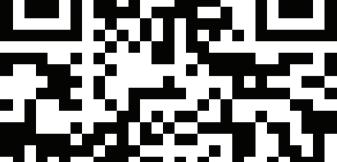
Kadija “OTR Traitor” Osman
Apurba “Cold Doesn’t Bother Me” Roy
Haley “New York Fashion Week
Abby “Fun and Satire Debut” Hughes
Fatima “Tim’s Fanclub Pres” Raza
Nicole “Does It All” Agyenimboateng
Haley “NYFW” Sengsavanh
Zoha “An Artist’s Bestie” Naghar
Being transparent with students about their partnership with TPS is the bare minimum. The bar is on the floor.
By Abeer KhanI remember when I first got my acceptance notice from Toronto Metropolitan University (TMU). During my lunch break, I was sitting inside my communications technology classroom, logging onto the Ontario Universities’ Application Centre website for the twentieth time that week alone. Suddenly, I noticed something looking different on my screen.
It said I had been accepted. I had finally weaseled my way into TMU’s (allegedly) very prestigious School of Journalism and I was over the moon! After spending countless nights on my portfolio, pestering my English teacher for higher marks and praying desperately every night, my dream finally came true.
In my head, I had a very idealized version of this university. I thought it could do no wrong. It was in the heart of downtown Toronto, had some cool programs and a cool geometricshaped building that would make for some hot Instagram stories. I had the notion that this school, which prides itself on diversity, equity and inclusion, would be a place free from the racism and intolerance I was familiar with in high school.
I looked at this school through rose-tinted glasses. Today those glasses have been shattered—a direct result of the countless times this university has disappointed me and much of their student body, especially racialized students.
Earlier this month, the school announced in a Toronto Met Today statement that there will be increased security measures in Kerr Hall and on campus following a months-long safety audit. This announcement came after TMU introduced several additional “security enhancements” prior to and during the fall 2022 semester. According to the school, security guards, officers and crime prevention specialists will be “visibly” placed to monitor areas on campus with an emphasis on Kerr Hall.
TMU also said it will continue its partnership with the Toronto Police Service (TPS) to have officers patrolling campus, which the school said in November that it started prior to the fall semester. This partnership entails having “officers on foot and bike patrol who proactively engage with our on-campus community to provide an additional layer of support for our security team.”
These new measures are in response to sexual assaults which have occurred in Kerr Hall in March and November of 2022. And while I understand the need for more safety and do not discount the pain and fear many students—especially women—feel, increased security is
not the answer.
As I stated in an editorial in November following the fall security announcement, it’s important to understand who security and increased policing protect and who it ostracizes. For Black and Indigenous students and community members especially, increased security presence and policing can be uncomfortable and unsafe—and something many student leaders fought against just a few years ago.
This is not the first time the university has tried to partner with cops on campus. In 2019, they announced a special constables program which they subsequently cancelled in June 2020 following backlash and activism from Black and Indigenous community members.
It’s a known fact that the TPS has a strained relationship with Black and Indigenous people. In 2020, it was found that TPS used force on Black people about four times more than the rest of the population and Black Torontonians were five times more likely to experience force from police than their white counterparts, as reported by the Toronto Star
While I’m not surprised that TMU would soft-launch their part-


nership with TPS as opposed to being open and transparent about it, I am deeply disappointed and concerned. And you should be too.
What’s different this time is that the university didn’t have the common courtesy to publicly announce this partnership. A student or community member wouldn’t reasonably know this information, given the convoluted way in which TMU announced this partnership.
The hushed nature of TMU’s partnership with TPS also means one thing is clear: the university knew what they were doing was wrong. And in doing so, they’ve broken the little trust they had with students.

TMU students—especially Black and Indigenous students—deserve transparency from their school, especially in regards to their safety.
Universities are spaces where students come to learn, to expand their knowledge and find a community. Students pay thousands of dollars in tuition to attend this

school. They trust that in exchange for an exorbitant amount of money, they will receive a good education in a safe environment.
People trust this administration to also be transparent with them. It’s an unspoken contract. But if this school continues to treat students like commodities as opposed to human beings, they are going to break their relationship with students forever.
The Eyeopener calls on TMU to reconsider their partnership with Toronto Police pending consultation with communities who will be most affected. We call on TMU to consult Black and Indigenous community members in their decisions proactively, not after the fact.
We call on the university to look for meaningful ways to address safety concerns on campus that do not centre increased security, policing and surveillance on campus. And we call on TMU to start telling us what they’re doing behind closed doors because we deserve to know.
As Lila Mansour began studying for her Law School Admission Test in early 2020, the now second-year Toronto Metropolitan University (TMU) law student started to consider joining Twitter for the first time. Mansour heard that the platform would be a great place for her to engage with politics and thought she’d be able to connect with like-minded individuals on the website.
Growing up in Prince George, B.C., Mansour says it sometimes felt like she was the only person who wore a hijab in the city. She jokes her peers didn’t even know enough about her faith to actually be Islamophobic—but Mansour knew her religion made her identity stick out at a young age. Out of the 74,000 people living in Prince George, only 115 identified as Arab, according to a 2021 census of the city.
Sitting alone on her living room couch, she remembers how her parents raised her to be informed about politics—Al Jazeera and CNN often fueled conversation in her childhood home—and wanted to feel more connected to political discourse again.
As the first lockdown forced Mansour indoors and away from the town’s only mosque, she made a Twitter account and finally found her place among “Law Twitter.” After George Floyd’s death in May 2020, Mansour began seeing conversations about politics and justice happen on social media in
Words by Asha Swann Visuals by Vanessa Kaukreal-time, compelling her to start following and retweeting accounts to further the conversation.
“[Twitter] was a place where you could hear different ideas, engage with different people. What I wanted was just to be involved politically,” says Mansour.
“Seeing the kind of collective energy on Twitter was very empowering.”
There are countless “Twitter communities” on the popular social media platform and they often aren’t separate from the app. These communities are integrated into your timeline based on the accounts you regularly interact with and follow.

Users who belong to specific communities will often colloquially refer to their version of the app. For example, in Mansour’s case, she often says she’s on “Law Twitter.”

“I’ve been able to get a lot of insight, great advice from people through Twitter and Law Twitter as well,” Mansour says.
“It’s also a great platform to get to see professors or other legal professionals outside of their professional scopes.”

However, these last few months have left Mansour feeling worried about the app’s future.
As a visible minority on social media, Mansour is concerned that tech mogul Elon Musk’s takeover will result in more hate speech across the platform.
In mid-April 2022, Musk publicly declared his interest in purchasing Twitter, despite the platform not being for sale at the time, according to ABC News. By April 28, the board unanimously voted in favour of Musk purchasing the platform for $44 billion USD, according to CNN. He officially became the owner and CEO of Twitter in October 2022 when the acquisition was finalized.
In the following weeks, Twitter’s top executives were fired and hundreds of staff resigned while others were let go, due to Musk’s promise to input a new, “hardcore” work model, according to a Euronews and Reuters report.
Today, many Twitter users feel as though they’re watching their beloved social media site crash and burn in real-time. Within weeks of Musk’s leadership, controversial figures whose accounts were formerly banned such as Andrew Tate, Donald Trump and Jordan Peterson all had their ac-
counts reinstated. Though Musk describes himself as a “free speech absolutist,” data shows that some speech allowed under Musk’s jurisdiction is actually hate speech.
The Network Contagion Research Institute, an organization that analyzes hate-speech online, reported that racial slurs, including the N-word, increased by over 500 per cent within 12-hours of Musk’s takeover. The Washington Post reported that on the same day, pro-Nazi tweets and swastikas were trending worldwide. In December 2022, the Anti-Defamation League, one of the most prominent anti-hate groups internationally, reported that antisemitism has risen across the app, while moderation of hate speech has decreased.
TMU students who once found solace in Twitter communities have also noticed the change and some now feel differently about using the platform. While Twitter is still used for activism, the site no longer feels like a community, according to Mansour, who admits that she’s now looking for like-minded individuals on Instagram.

Caitlin Andrews-Lee, an assistant professor at TMU’s department of politics and public administration, has been studying the implications of charismatic leaders for over a decade. She explains that a true charismatic leader is someone who gains controversial popularity by circumventing traditional legislation and gaining power through populism.
Andrews-Lee says Musk’s internet presence—specifically relating to social issues and activism—helps add to the popular narrative against political correctness, which Musk once described as one of “the biggest threats to modern civilization,” in a podcast with The Babylon Bee, a conservative satire website.
“He makes fun of the Black Lives Matter movement and gender pronouns and [other] things,” Andrews-Lee says. “And so he’s kind of capitalizing on this resentment and backlash effects.”
“I think I was very lucky to be on the platform when we saw the rise in many social justice movements,” Mansour says. “Twitter has always been viewed as a space for people to amplify their voice, whatever movement or whatever cause they’re advocating for. I think that’s probably the main thing that attracted me to the platform.”
“I walked down my childhood street and I was like, ‘Oh, my God, I lived near Nazis,’” they say.
Shannon, who has been using Twitter since 2016, says they’re noticing more hateful accounts on the app since Musk’s takeover.
“Even just random tweets will have more hidden replies, there’ll be more ‘Make America Great Again’ bigots and stuff just piping in,” they say.
Shannon also explains that while issues of bigotry and intolerance aren’t just exclusive to Twitter, they do see Musk’s takeover as symptomatic of greater issues in society.
“It speaks to a larger conversation about how visible minorities are always going to have targets on their backs unless we deconstruct white supremacy and Islamophobia and all these other power systems in our society,” they say. “I think Elon is just another symptom of that.”
“He thinks that just being a free speech absolutist, you should be able to say whatever the fuck you want, whenever you want,” Shannon says.
Shannon admits that there were issues on Twitter before Musk’s takeover as well. Accounts that often engage in political discourse have long been subjected to temporary suspensions or permanent bans. In 2019, during the Hong Kong democracy protests, NPR reported that Twitter suspended around 200,000 accounts that the app believed were bots spreading misinformation about China in an attempt to discredit the pro-democracy movement.

During the summer of 2018, Twitter suspended over 70 million accounts as part of a larger “campaign against bots and trolls,” according to a The Washington Post article, which did not confirm exactly how many of the deleted accounts were actually bots. In 2019, users also began wondering if the personal politics of then-CEO Jack Dorsey were behind the app’s censoring of content, as reported by Vanity Fair. Musk’s own account was temporarily suspended in 2018, which led to fans asking him to buy Twitter for the sole purpose of deleting it.


“Meta, with Facebook and Instagram, says no nudity. Twitter doesn’t have that,” he says. “Does that mean you’re censoring people on those platforms? There are those who would argue that you don’t have free speech because you can’t put nudity.”
While Twitter does permit nudity, abusive content is technically prohibited under the site’s regulations. Twitter’s own hateful content policy admits that, “For those who identify with multiple underrepresented groups, abuse may be more common, more severe in nature and more harmful.” These groups include people of colour, women, 2SLGBTQIA+ people or other “marginalized and historically underrepresented communities.”
Shannon says the issues extend beyond only seeing hateful content toward trans people on Twitter. Another problem, they explain, is that even just positively participating in tweets made by a trans person can leave you bombarded with hate.
“I remember replying to something in a thread and just being inundated by MAGA trolls,” they say, referencing a thread where transgender people were discussing access to medical care.
When Shannon’s tweets get lots of attention, they often fear they’ll receive hateful comments or even death threats, as they’ve seen such previously happen to their friends.
Shannon also explains that people may assume that online spaces with young people are more progressive—but that isn’t always the case. They say their grandparents have been more open-minded when it comes to trans issues than some members of younger generations on social media.
“I grew up with my baby boomer grandparents…Maybe they’re not using ‘politically correct’ language but they were speaking positively…they’re still open to those ideas,” they say. “Whereas now, I’m seeing people younger than my grandparents who are just jumping onto these reactionary positions that are based in fear.”
Just like Mansour, fourth-year English student Elle Shannon, who is non-binary, knows first-hand how much it hurts when the community you live in treats you like an outsider. They also have a transgender sister and remembers their sister being bullied and picked on by both teachers and students as she grew up. Even now, as they’re both adults, Shannon says the rejection from their local community continues.
Last October, Shannon and their sister were visiting their father’s grave in the town’s cemetery when a local man approached them and started questioning their identities. The man demanded to know what they were doing and how long their family lived in their small community within Niagara Falls. Shannon says the man seemed skeptical of them until they mentioned knowing multiple families who had also lived in the town for several generations.
“I don’t know if he saw himself as the graveyard watch for the town but I’ve never in my life been interrogated in that small town,” Shannon says, explaining that it was this and similar experiences of small town bigotry that originally drew them to Twitter’s social justice community.
When Musk officially announced his intentions to buy the app in April 2022, he tweeted that he hoped to make the website open source, increasing transparency in what content the algorithm would promote. He also described Twitter as “the digital town square,” explaining that free speech would be prioritized while bots would be “defeated.”
Andrew Selepak, a professor of social media at the University of Florida, has researched Twitter before. Selepak explains that while free speech is protected under United States law, social media platforms have a right to regulate content under their terms of service.
Mansour isn’t on Twitter as much these days. She hasn’t deleted her account but she knows the app isn’t the same since Musk’s takeover. Instead, she’s been spending more time on Instagram, explaining that the popular photo and video-sharing app is the place to be for people in their 20s.
Despite the two platforms’ differences, Mansour says Instagram is similar enough to Twitter that she still feels a part of a larger community of like-minded, politically engaged individuals when she’s using the app.
She says that people like herself, who often use social media as a tool for advocacy, understand that rules have to exist to keep people safe.
“We have the power to move away, or to use or to engage with a specific platform,” she says, criticizing Musk’s take on free speech.
Mansour admires the real-world community that living in Toronto has brought her. In the city, she can connect with other Syrian Muslims that she couldn’t find in Prince George. Mansour follows accounts on Instagram that are localized to Toronto, like the Muslim Legal Support Centre, Islamic Relief at Toronto Met University and The Arab Community Centre of Toronto where infographics provide helpful visuals.
“Despite the many ills that social media can have, I think it’s contributing so much to society,” says Mansour.
“But right now, Twitter is like ‘the Wild West’ of social media.”


Even though she’s on Twitter much less now than she was two years ago, Mansour wants to remind people that all social media sites must have certain protections in place to avoid hate speech towards minorities.
“I think it just [goes] to show that we can’t live in a space where there are no laws, no regulations, no rules,” she says.
“As humanity, we cannot manage without rules.”
The early days of the COVID-19 pandemic were a time for people across the globe to pause and reflect. For some, it provided an opportunity to create and do more of what they love.
For Zoey Ryen, being in lockdown was her time to write the first song she’d release on an official streaming platform.
Titled, “A Place I Know,” the song helped the musician gain her spot in the professional music program at Toronto Metropolitan University (TMU).
The now-second-year student was 17 years old when she started to use the time she had at home due to the pandemic, to expand her musical abilities beyond playing the guitar. Ryen said she taught herself everything, from using GarageBand to other professional music soundtracks to create her own tracks.
She said she was inclined to make music because she saw it as an outlet to release her feelings and emotions.
“It was wild to me that I can have all of these feelings and experiences bottled up into a song and people can hear that and understand what I was going through,” she said.
In November 2022, Ryen released her EP, “Listening Through
Walls.” Her music falls into a crossover between the pop and alternative/indie genre.
She said the concept of the EP is the experience of living in isolation during the pandemic, going through growing pains and untouched trauma. Ryen said the EP is a reflection of all of her emotions in situations such as depression, break-ups, losing people and family troubles.
“Through making my EP, I was able to grow and start a new chapter in my life and let go of a lot of stuff,” she said.
Ryen also expressed the importance of authenticity and why she actively chose to write about what was currently going on in her life. She said when she released her first single, “A Place I Know,” people reached out to say that they related to the song, and to Ryen, that was special.
“If [the listeners] can feel heard, then that is a win for me and that’s what I hope listeners can feel through my music,” she said.
Alongside her emotions and experiences, Ryen said another experience that inspired the EP was being able to collaborate with her producer, Jacob
Leger, a fellow professional music student at TMU.
She said she enjoyed collaborating not only to create—but for support as well. “Listening Through Walls” deals with some heavy emotions, Ryen said. She added that it was nice to have a support system that shared joy in her art and also cared for the accurate storytelling of her experiences.
“When you’re handling emotions that are so heavy…it’s a great feeling to know that someone else wants to hear this and they want it out,” Ryen said.
She also spoke about her love for the professional music program and the connections it has helped her make, including Leger. She said the program is a perfect balance between creativity and business.
When it comes to Ryen’s inspirations and favourite artists, she said she was a big fan of Phoebe Bridgers’ music and lyrics. However, as she’s grown into a better, more happier space, she has been more interested in electronic music and has become a huge fan of Brit-

ish producer, Fred Again.
“It’s interesting to see how the artists you listen to kind of mirror how you’re feeling at the time and it’s interesting to see who my inspirations are and who they were back then.”
Looking to the future, Ryen said there is new music on the way, as well as live shows in the works, both in Toronto and internationally, in the upcoming summer. She said she also hopes to perform back home in Southern California.
Ryen’s music can be found on
With shorter days and colder nights, the winter blues influence us all in one way or another.
While it can seem impossible to feel joyful or productive during the tough winter months, listening to our favourite melodies is an easy fix to raise spirits.
Here is a hand-picked list of uplifting and lively songs to get you through the winter blues.

“Afraid
doing what we love. Whether that be by pursuing our passions, finding love after learning to love ourselves or finally securing freedom in our lives.
“Good Days” by SZA SZA’s lead single from her 2022 album, SOS, is the perfect go-to song for those cloudy and gloomy days, as it’s all about moving on from
the past onto bigger and brighter things. This song focuses on taking steps toward healing and having a positive outlook with the hope for better days to come. It oozes optimism which is significant to bear in mind, especially with the start of the new semester underway.
“GOOD
This is a vibrant tune with its funk-
meets-soul dance tune and is a joy to listen to on a loop. This fun track is undeniably exceptional to sing along with while blasting it from the car stereo.
“Happiness” by The 1975 Released in 2022, “Happiness” encapsulates the excitement that comes with the beginning of a romantic relationship. It emphasizes that love
can be beautiful yet scary and that we should not doubt ourselves during the process but instead remain hopeful for what is to come.
Without a doubt, LF SYSTEM’s 2022 single “Afraid to Feel” is one to dance to, with its catchy beat and captivating lyrics. This hit is all about attraction and passion and taking that leap of faith to try something new. While initiat ing romantic relationships can be scary, the song urges listeners to not be afraid to feel and just go with the flow.
“BREAK MY SOUL” by Beyoncė
This single released by Beyoncė in 2022, completely covers what it’s like to live a stressful life driven by duties and responsibilities that work us to the bone. It points out the importance of having a healthy work-life balance and ultimately
“Holiday” by Confidence Man Confidence Man’s single from their 2022 album, TILT, is a playful electro-pop jam that encourages its listeners to take risks and live life to the fullest. It presses the overall notion that to truly experience life and all the joys it has to offer, we must escape from the restraints of day-today life and find a way to embrace freedom in our actions and choices.
“Hot In It” by Tiësto and Charlie XCX
This 2022 club-pop banger is the ultimate feel-good and confidence boosting song. At its core, it’s about looking hot on the dance floor to get over a breakup. If you want to feel like your best possible self in 2023—breakup or not—this song is perfect for you.
I
This OneRepublic single radiates summer vibes and is excellent to listen to during your post-holiday funk. “I Ain’t Worried” encourages listeners to make the most
“I was able to grow and start a new chapter in my life”
Now that the winter 2023 semester is in full swing, this is the perfect time for you to join university events and find your community on campus!
To help you get started, The Eyeopener has compiled a list of upcoming events where you can have fun and meet new people. Check out these events happening between now and the end of February for you to enjoy!

No matter your major or background, you can explore different career opportunities at the Human Resources Student Association career fair! Expand your knowledge and seek out opportunities that help you reach your professional goals.
The fair will be happening virtually on Jan. 26, from 6 p.m. to 8:30 p.m. and is open to all Toronto Metropolitan University (TMU) students.
For more information and to register, visit @tmuhrsa on Instagram.
Join the TMU Sikh Student Association (SSA) for a night of games, laughter and fun! This is a great event to meet the SSA team and make friends with other Sikh students at TMU.
The game night will be on Jan. 26, from 6 p.m. to 9 p.m. at Snakes & Lattes on Bloor Street West.
For more information and to register, visit @tmu_ssu on Instagram.
TMU-KPOP Club Winter Orientation
TMU-KPOP is a community of students who share a love of Korean music and culture. On Jan. 30, they’re holding an evening of fun activities, games, prizes and of course, random play dance!
Join the orientation from 6 p.m. to 9:30 p.m. at the Tecumseh Auditorium in the Student Campus Centre.
For more details and to RSVP, visit @tmu_kpop on Instagram.
Sharing Circle #1: Coffee With a Shot of Culture

Join students and cultural ambassadors in an opportunity to share experiences and learn and reflect on intercultural topics.
At this fun and informal session, you’ll engage in meaningful discussions and learn how to effectively communicate with people from other cultures. You’ll also gain helpful tips on social communication and contact strategies, while participating in fun activities and indulging in free food!
If you’re interested, join this session on Jan. 30, from 11 a.m. to 12 p.m. at Cafe 808 on Gerrard St. East. For more information and to RSVP, contact the International Student Support (ISS).
Therapy Dog Mondays
TMU’s Therapy Dog Program
aims to improve mental well-being for students. According to the American Heart Association, studies show that dogs reduce stress, anxiety and depression, ease loneliness, encourage exercise and improve your overall health.
Relieve some stress and play with puppies every Monday, starting Feb. 6, from 1 p.m. to 2 p.m. in the Podium Building room 60.
Coffee, Cookies and Crafts for 2SLGBTQIA+ Students
This is the Tri-Mentoring Program’s first 2SLGBTQIA+ Group Mentoring event of the winter semester and it’s full of fun crafts and snacks!
There will be paint, button making supplies and more available for
you to use. You’re encouraged to bring your own art projects to work on as you enjoy lots of coffee, hot chocolate and cookies!
Sound like fun? Then join in on Feb. 2, from 1:30 p.m. and 3 p.m. at Pitman Hall room 200.
For more details on this event, contact tmp2slgtbqplus@torontomu.ca
‘Yes, And?’ Improv Drop-In On Feb. 8, from 6 p.m. to 7 p.m., join ‘Yes, And?’ an improv event at Kerr Hall East room 127 where you’ll play games without the pressure of an audience!
This casual weekly drop-in is open to all students at TMU from any faculty!
‘Yes, And?’ seeks to create a safe space for students to perform and ex-
pand their skills in comedy.
Join Consent Comes First, the Centre for Women and Trans People, Tri Mentoring and BIPOC Students Collective in a conversation about Black healing! This event will honour the release of the We Heal Together colouring book, and We Are Spectacular Nebulas in the Healing Journal while a group of Black student leaders lead a conversation about healing in the Black community.
The event is open to all Black TMU students and will run at Oakham Lounge on Gould St. from 2 p.m. to 3 p.m. on Feb. 15.
For more info, contact osvse@torontomu.ca
Have you always been good with kids? Then you’re in luck, because sometimes parents need some time off, leaving their children in need of a babysitter. This is where you step in.
You can, of course, pursue the more classic route of babysitting in your community but there are also websites such as Sitly and Mother’s Helpers where you can sign up to be connected to a network of people seeking babysitters or nannies.
Keep in mind that many babysitting platforms require references and a background check.
If you’re looking for a way to get rid of your old clothes, you might want to consider reselling them on apps like Poshmark or Depop. You will have to put some effort into taking pictures of what you’re selling but once that’s out of the way you’re good to go!
If you have any old toys, furniture or other knick knacks you think can be better used by someone else, Facebook Marketplace is a great option. You might have exactly what someone else is looking for!
Complete paid surveys online
By Natalie VilkoffAs defined by the Urban Dictionary, a side-hustle is the second or even third job someone has to work “to meet the same standard of living their parents had 30 years ago.”
Especially as students, a little extra cash is never unappreciated.
Coupled with the rising cost of living and inflation, it might be nice to know that you can earn a little more to spend on a treat for yourself.
So, if you have a bit of extra
time, here are some simple money-making endeavours to pursue on the side.
You might not remember much from high school but as long as you have a good understanding of high school level subjects like science, math and English, you can use that to your advantage and sign up to tutor online. You might have to submit documents such as a transcript to prove you’re qualified to tutor
that subject and some sites require a background check. But once you’re approved, you can set your own schedule and your income will depend on the amount you work.
TUEX and Cambly are just two examples from a multitude of online tutoring platforms where you can sign up to pass knowledge onto others—for a price of course. Most tutoring sites charge a small commission but otherwise you can make about $10.20 an hour, according to the Cambly website.
If you don’t get along well with kids, maybe animals are more your thing. With apps like Rover, you can sign up to be a dog-walker or even a house sitter. Rover allows you to set your own prices but generally the starting rate for dogwalking is $15 an hour.
This way you can get exercise AND hang out with a dog, all in a way that works with your schedule.
Sell your used clothes and items
This is a simple, passive activity that comes with the benefit of getting paid from home. Market research companies such as Survey Junkie are constantly looking for customers’ opinions. By completing surveys which range from 1-5 minutes and pay about $0.40 to $5, per survey, you will receive points which you can redeem on the survey website.
This won’t make you a millionaire, but could be good for when you have some extra time and could use a few extra bucks.
mass and play with no knee pain, then anyone can do it.”
Ivymae Perez, a Bold midfielder who has grown close to Rhooms since joining the program, has seen her persevere through all of the obstacles.
By Jordan JacklinThe Toronto Metropolitan University (TMU) women’s soccer team was eliminated on Oct. 26 in their opening playoff matchup against the Toronto Varsity Blues. But on a clear October evening— their first training session back from the heartbreaking defeat—the young team is joyful and working toward the next season.
Bold right-back Alexia Rhooms is one of the first players to step on the pitch past the white stripes at Downsview Park. There’s an instant upbeat energy in the air that carries over to the other players. For those who know Rhooms well, this comes as no surprise.
“She’s one of the most dedicated players that I’ve coached in my career,” said John Yacou, the Bold’s interim head coach. “She always strives for more. Regardless of how she plays, she still believes that she can do better.”
There was a time when there was little hope for Rhooms, who suffered three anterior cruciate ligament (ACL) tears in her right knee during her high school career.
Grade 11, she suffered another ACL tear which then started to raise concern for her athletic future.
As the injuries continued to pile on, the options grew thinner for the defender. After tearing her ACL for the third time in Grade 12, she had to turn down American offers and opted to stay in Canada.
“I took a break from soccer, as I was not mentally there to continue after the third [ACL] injury.”
After debating whether to continue her playing career, Rhooms took a break to focus on her education.
From 2016 to 2020, she attended Western University to study Kinesiology while soccer had become a leisure activity, as opposed to a part of her daily routine.
“I studied Kinesiology and didn’t even touch a soccer ball,” said Rhooms. “I was just a student and thought my playing career was behind me.”
During the midst of the pandemic, her father—who is a personal trainer—ordered an exercise bike for the family. Having the equipment in her household motivated Rhooms to begin training again on a regular basis. Once she got back into the gym, her eagerness to play only grew as her passion re-emerged.
League1,” she said. “After joining League1, I grew a relationship with my team coach Natalie and she offered me a scholarship.”
After joining TMU last off-season, Rhooms was determined to play in every game. Being one of three players to accomplish this feat, she suited up for 13 games between the regular season and the playoffs.
“I’m my worst critic and I thought that I wouldn’t be good enough to dress sometimes,” she said. “I just went to every practice and worked hard for my goal of being a starter on this team.”
KONNOR KILLORAN/THE EYEOPENER“Going through that journey is a sign of strength. When you come out of surgery, you have to start from scratch but it’s a way of resetting and becoming a better version of yourself,” said Rhooms. “If I can come back three times, lose muscle
“I am so proud of how she’s performed the entire season. She works so hard and puts her body through everything.”
Although she is graduating this year with a bachelor’s degree in business management, it doesn’t rule out the possibility of returning to the team next season.
It’s an important summer for Rhooms, as she looks to continue to lead by example and bring this team to greater success.
“I have so many years left of eligibility, that I might use another one to come back. This team is like my family.”
When a player suffers an ACL injury, they are causing strain to one of the key ligaments that stabilizes the knee joint. According to UCHealth Today, the timeline for recovery is usually eight to nine months, with the fastest recovery being six months at the earliest.
In Grade 10, Rhooms suffered her first ACL injury and took six months to recover. This was a pivotal time in her life, as she was trying to get recruited to play for a Division I or Division II school in the United States.
Within the next year, while in
Prior to the 2021-22 season, Rhooms started to train with the mentality that going back to school was an option. In order to stay in game shape, she needed to find an organization that was willing to play her. Once she discovered that the Oakville Blue Devils, an organization in League1 Ontario reserve, were holding a tryout, she made sure to capitalize on the opportunity.



After joining the semi-professional league for the 2021-22 season, Rhooms’ League1 coach was willing to give her a chance to suit up at the next level. That coach was Natalie Bukovec, who is normally TMU’s head coach and currently on maternity leave.
“I never thought that I could play at the university-level but potentially
Rhooms is very open about her recovery process and wants to help inspire others currently going through similar scenarios. Her teammate Kaleigh McKye even suffered an ACL injury midway through this season.
“She’s one of the most dedicated players that I’ve coached in my career”
“I just went to every practice, and worked hard for my goal of being a starter...”
“I was just a student and thought my playing career was behind me”
I’d heard mention of so-called “professional students”—those who’ve been in school for what seems like a lifetime, maybe because they’ve switched degrees, chose to pursue a post-grad program or just enjoy being told what to do.
I thought the title was simply a mocking name, an ancient academic fable. That is until this week.
It was the first day of my master’s degree in communications and I was jazzed. And not just because it bought me two more years to think about what I actually want to do with my life.
The class was packed like the subway during rush hour when a scruffy looking guy in jeans, sporting a Guelph University hoodie and a worn Tim Hortons limited-edition
beanie walked in. He secured the only available desk, directly to my right.
He looked just slightly weathered as though life was beginning to beat him down—the tell-tale expression of someone on the brink of 30.
“Nice hat,” I said sarcastically.
“Thanks, it’s ironic,” he said. He smiled with the dim-witted exuberance of a golden retriever puppy. “My name’s Stu… Stu Dantt.”
“Abby,” I replied. “What do you study?” I asked Stu, mostly excited for him to flip the question back to me so I could reaffirm why I’m taking two ye—I mean why I’m so EXCITED about my masters.
“Right now? Philosophy. Who knows in the future though,” he said.
The look on his face told me he knew how confusing that answer was for me. The fuck did he mean by “right now”? And what was that

about the future?? How dare he lead the conversation away from my very valid and important degree choice?
“What do you mean ‘right now’?” I questioned, evidently annoyed.
“You see, I’m what you’d call a professional student. I’ve been in school for,” he said before starting to count on his fingers “Eleven years now,” he finally stated. “And today’s the first day of my latest degree in philosophy.”
I was so bewildered I didn’t know where to start with my questions. Stu took that conversational opening and ran with it.
“I started out just like many other youngsters who also don’t know what to do with their lives, I took a business degree. Generic, but can’t go wrong, right? I took my time with the degree. Then toward the end, I just really didn’t want to stop suckling on Ontario Student Assistance Program‘s (OSAP) sweet, sweet teat, so I kept on going. I got a master’s in history and now here I am: a philosopher for the next few years. Then, who knows what?”
Aghast, I finally made my mouth move to produce a stammered question: “But do you never want to use your skills? To perhaps help other people? Or contribute?”
“Oh god no! What if I tell an inspiring historical tale about the gold
rush to a business client and they invest all their money in gold?” Stu says.
“And what if they hold me accountable?” Stu shudders at the thought.
“No, I prefer to keep it all up here,” he grinned, tapping his temple.
“So, what do you mean, “professional student?” I asked. “What happens when you leave school and have to pay off all your debt?”
Before I could bombard him with more questions, Stu held up a pointer finger, holding his place in conversation and effectively stopping my next word. He exhaled a puff of vape smoke slowly and stealthily so as to not produce a cloud.
He chuckled slightly and leaned in close. “Oh, I’m never leaving. If you never leave, you never have to pay off your debt,” he said with a sly smile.
“OSAP money and my side hustle are enough to give me everything I need. I sell t-shirts with non-fungible token (NFT) artwork printed on them. It kinda distorts the point of the NFT, you know?” he said.
I guess I still look puzzled, as Stu added, “It’s pretty deep. I wouldn’t expect a youngster like you to get it.”
The professor began class just as Stu rambled something about being a “vessel for the spirit of academia,” but I heard almost none of
what he said. I’ll admit, I began contemplating the “professional student” lifestyle. Did I really want my masters or did I just want to have a place to show up that gave me a sense of purpose?
When the professor took a break an hour into the lecture, Stu began to head for a smoke break and asked if I wanted to come. I declined and instead whipped out my laptop to see how long you can actually take OSAP for, the curiosity tickling my brain.
Turns out Stu’s plan wasn’t so sound—like, at all. OSAP cuts the cord at 340 weeks of funding and by my math, Stu wasn’t going to be getting any money for his new philosophy degree.
Stu sauntered back into class after the break and reclaimed his seat next to me. “Miss me?” he asked.
“Uh, sure. Hey Stu, sorry to break this to you,” I started. “But…um, you do know OSAP stops giving you money after about 10 years right?”
Stu paused, looked confused and then smiled. “Nah, that can’t be true. I definitely scammed the Matrix on this one.”
Hastily grabbing my laptop, his eyes scanned the website over and over, while all the colour from his face drained. His cheeky smile turned to a wide-eyed, full-teeth grimace.
“Oh no no no, what have I done,”

habits die hard I guess.
Tossing my cup into the trash, I headed over to my gate.
First Stop: Madrid, Spain I stepped out of the airport and was greeted with the fresh breezy air of Madrid. There was only one thing on my proud Canadian-wired mind— find the nearest Tim’s.
on my tongue and the shock of Tim Hortons being capable of something more than just the bare minimum, I knew I had to visit a Tims here in the UK. Despite being an airport Tims, the menu was surprisingly huge.
Sriracha Hot Dogs? Pancakes?
aromatic spices such as cardamom, cloves and ginger infused into the milk. Needless to say, it easily puts any “chai tea” to disgrace.
Have you ever heard someone say something and immediately thought to yourself “no way?”
Just last week, I learned that cows can only be female. My ENTIRE life, I thought cow was the word for the animal but no—it’s literally just the word for the adult female cattle. Then I was told that vacation-high and post-vacation blues are real things. I thought everyone was exaggerating about missing the food or experience after coming back home but boy did I learn that once you get ’taste’ of vacation, it’s hard to forget.
It all started on a chilly Tuesday evening in December. I was waiting at Toronto’s Pearson International Airport, just hours after finishing my
last exam. Where was I going, you ask? India! But, as someone who hates any flight longer than five hours, I decided to plan two pit stops along the way. I figured it would also be good for my Instagram highlights. Let’s just say that evening, only one thing was flying high and it wasn’t my grades.
To kill some time and soothe my caffeine crave, I grabbed a cup of Tim Hortons iced coffee that never seems to taste the same. I’m convinced that Tim’s headquarters releases the recipes through a broken telephone system and by the time it makes it to any of my local shops, you get the most warped and wonky version.
Two sips later, I was down to a cup full of ice and that atrocious soggy paper straw. “Get a reusable straw that doesn’t taste like the bottom of a shoe,” I tell myself every time. Old
Courtesy of Dora the Explorer and Duolingo, my limited Spanish vocab got me to a Tims. I was shocked at the length of its menu. With so much on the menu to choose from, I got a cup of Papaya and Pineapple Juice along with a Runny Nutella Cookie. Honestly, even if my computer served me these runny “cookies” nothing could stop me from accepting them. The cookie was nothing short of exquisite. This was one of these “no way” moments. You’re telling me Tim Hortons is capable of this and yet I can’t even get the Strawberry Filled Donuts at my local Tims?
After spending hours devouring the delicacies available exclusively at Tims in Madrid, I had to depart and head off to catch my next flight.
Second Stop: Stopover at Birmingham, United Kingdom With the flavours of Spain still fresh
LATTICE FRIES? Where am I? The most my Tims has given me is a pain in the ass from having to repeat my order 50 times before the cashier gets it correct or having my Boston Cream Donut kissing the paper bag.
After spending a healthy seven hours at Birmingham airport, it was time to head to my last stop.
Final Destination: Delhi, India You guessed it, my first stop after arriving in India was their Tims. Let me just start by saying they were serving and I’m not just talking about the Chicken Tikka Croissant Sandwich.
With just one bite, the flavours and aroma took me right back to my mother’s kitchen. As a Canadian who rarely gets their hands on a nicely toasted croissant with a semi-melted slice of American cheese, this heavenly sandwich came as a shocker.
Paired with the scrumptious croissant, I drank a cup of Kadak Chai, which is a strong black tea with
Instantly coming out of the airport, I was greeted with the gloomy skies of Toronto and the effects of my vacation high began to wane.
In the days leading up to school, the lack of sun was getting the best of me. After a few days laying around, I decided to get myself Tims on the way to my first class of the semester. Conveniently enough, my class happened to be in Victoria Building, right across the beloved coffee shop.
“I’ll have one small chai tea, two milk and two sugar,” I said. The thought of the Kadak Chai from India fogged my brain and the shame of saying “tea tea” was eating me alive.
“Anything else?”
“And one Boston Cream Donut,” I added, hoping the cream and chocolate would fill the void of not having runny Nutella cookies.
“Sorry, we’re out of those.”
I shut my eyes and inwardly shook my head, thinking if I try hard enough, I can turn back time and return to my vacation bliss.
